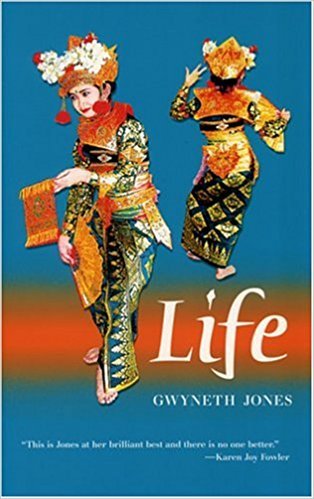Life by Gwyneth Jones
Jul. 3rd, 2017 09:38 am I first encountered the fiction of Gwyneth Jones when her novel White Queen was published in the US in 1991. I immediately felt I'd discovered the heir to Joanna Russ and went back and read what I thought were her earliest novels, starting with Divine Endurance, although I see that Wikipedia now list four earlier novels. Her American editor was David Hartwell, and we discussed the rest of the Aleutian Trilogy, which started with White Queen, as it came out. Something about the third book, The Phoenix Cafe, with it's cavalier attitude toward men as an eternal danger to women and children, really put me off, however, and I gave up on Jones after that, although I was still curious enough about her to pick up the first book of her next series, Bold As Love at the Eastercon on my TAFF trip in 2003. I don't think it ever had a US publisher, nor did the rest of that series. I took it off my To Be Read pile not long ago, and bounced off what I found to be a very confusing story about European politics (seemingly very prescient in the post-Brexit world) and countercultural defiance. I switched to another book of hers in the Pile, Imagination/Space: Essays and Talks on Fiction, Feminism, Technology, and Politics, which I found completely fascinating. Having consulted with Claire Brialey about her own experience reading Jones, I settled on Life as the next novel to try.
I first encountered the fiction of Gwyneth Jones when her novel White Queen was published in the US in 1991. I immediately felt I'd discovered the heir to Joanna Russ and went back and read what I thought were her earliest novels, starting with Divine Endurance, although I see that Wikipedia now list four earlier novels. Her American editor was David Hartwell, and we discussed the rest of the Aleutian Trilogy, which started with White Queen, as it came out. Something about the third book, The Phoenix Cafe, with it's cavalier attitude toward men as an eternal danger to women and children, really put me off, however, and I gave up on Jones after that, although I was still curious enough about her to pick up the first book of her next series, Bold As Love at the Eastercon on my TAFF trip in 2003. I don't think it ever had a US publisher, nor did the rest of that series. I took it off my To Be Read pile not long ago, and bounced off what I found to be a very confusing story about European politics (seemingly very prescient in the post-Brexit world) and countercultural defiance. I switched to another book of hers in the Pile, Imagination/Space: Essays and Talks on Fiction, Feminism, Technology, and Politics, which I found completely fascinating. Having consulted with Claire Brialey about her own experience reading Jones, I settled on Life as the next novel to try.Suffice it to say that I liked it a lot better than Bold As Love. In the meantime I also realized that one of the things that makes her an heir to Joanna Russ is her pessimism about the battle between the sexes and the ability of feminism to solve the problem. Life is a very complex meditation on this question. It's a story of gender and genetics, which poses the idea that genetics is what makes the difference an unbridgeable breech. She then imagines a genetic solution to this problem that is probably beyond my ability to describe, but basically it's a non-Darwinian way for genes to be selected. The upshot of this is that genetic sexes (based on Y and X chromosomes)seem to be on their way out evolutionarily.
It's also a novel about life as she is lived, following a group of friends who meet at university, fall in and out of love, and fall in and out of contact later in life. The protagonist, Anna, is a geneticist who discovers the change in the X/Y exchange and spends her life trying to prove it to a disdainful scientific establishment, where her gender is held against her. Spence is her husband -- the apparently ideal house husband and lover -- who still manages to interfere with her research with his emotional neediness. In many ways their frenemy, Ramone, is the most interesting character -- a feminist who despises women and becomes a media star as a pundit, along with her mentor, the mystical old schizophrenic Lavinia. Jones' novels are always sprawling, contradictory affairs, full of crisis and pain, and Life is no exception. Two of the female characters are raped under circumstances in which they are unable to report it without unacceptable repercussions, there's also a heartbreaking miscarriage, and Anna's career seems to be a long series of firings by petty assholes.
What kept me going through all the carnage was the fascinating characters grappling with their messy lives. In her note about the book "Life: an Explanation" Jones writes, "The story of Anna Senoz is not my life story (the scruffy and pugnacious Ramone, Anna's shadow girl, is more like me, if I could imagine myself a feminist media star). But in many ways it's the story of my life as a writer: the experiences that shaped me, the changes that swept over my world, the ideas that made me write the novels I've written, the people who have inspired me; the future I imagine." There's a personal, heartfelt, career-summarizing quality to Life that's refreshing. The science fictional content is relatively small scale, but it has a lot of layers, and I appreciate how Jones confronts the limitations of feminism while tackling the underlying problem with a grand SF concept that ultimately completely reimagines what it means to be male or female.